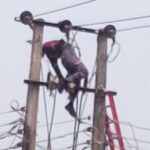
Last week, there was a news item about a 22-year-old Nigerian student who committed suicide because, he reportedly said, “God failed him.” According to the Kwara State Police Command, the student of Sheikh Kamaldeen Arabic School, Ilorin, left a suicide note addressed to his parents, where he wrote: “To my mum and dad, I am sorry, I did this because God did not answer my prayers, I will rather die than commit sin, please, forgive me, I love you, bury me at home.” A neighbour described the deceased as a devout Muslim.
For those who may not be able to empathise, or put themselves in the shoes of this victim, this is another story of a depressed young Nigerian, who probably was caught up with the suffocating societal realities of the time. At best, they might conclude that the late student was a religious extremist, who had chosen to stick to the tenets of his cherished way of life even unto death. But to some of us who understand the psychology of the devout, there could be nothing further from the truth. This is a clear case of externalisation of (mass) dissonance in today’s Nigeria. It has the potential of turning into an epidemic.
In my appraisal of history, something similar had happened in the United States starting from the 1960s, which was at the peak of the baby boomer era. There was sudden prosperity in the land, bang in the middle of (majorly Pentecostal) religious awakening. Many young Americans went berserk. They took to drugs and hippie lifestyle. The ones that did their best to strike a balance between spirituality and the dawn of new technologies created or embraced drug-induced new religious experiences in many forms. The drug daze that appeared on the horizon at that time led to sinister ways of life, inspiring mass murderers and serial killers, cults and hippie communes that threatened the very existence of the American system.
However, in our case, it is not about prosperity in the land; it is about widespread poverty and the struggle to keep up with the Joneses. It is a dissonance that occurs in the mind of the pious who is daily confronted with temptations presented by the façade of social media-driven nouveau riche. The irony of the situation is that the organised Church – and Mosque – seem to tacitly endorse these “young, rich and dangerous” Nigerians who have turned into an army of oppressors. They expect every other person in the room to join the mass choir, and never to criticise their way of life. But not everybody is wired with the material genome. Indeed, a few could take the easy way out instead of succumbing to the dazzling influencers. I am afraid Nigeria is presently witnessing a budding societal upheaval which our educators, social engineers and public intellectuals must ponder about.
The Creator made us in a special way. While some of us seem to be material-minded, others are clearly driven by intuitive convictions, believing in spiritual guidance, religious tenets and whatnot. This is the stuff of the human condition. We all have a bicameral mind.
We were created with the mammalian distinguishing factor of having the parts of the brain – the limbic system, basal ganglia and cerebrum – that do the interesting stuff that distinguishes mammalian brains from those of other species. Additionally, it is a fact that mankind stands apart from every other mammal because of his brain. It is the same part of the brain that makes him a mammal that still distinguishes him from other mammals: the cerebrum’s outer layer and the cerebral cortex are man’s true unique features. The cerebral cortex forms 80 per cent of the mass of a human brain, compared with 30 per cent of a rat’s.
It is divided into lobes, four on each side. The rearmost one, called the occipital, handles vision. Then come the parietal and temporal lobes, which deal with the other senses and with movement. At the front is the frontal lobe. It is this frontal lobe that makes us human because it contains many of the cognitive functions associated with humanness. Its hugeness is also the reason for our peculiarly shaped head. Language, man’s peculiar characteristic function, is located in the temporal and parietal lobes, and only on one side of the brain, usually the left.
I believe God gave us a bicameral mind so that we can be in control of other creations in our environment. Historians describe the era of the agricultural revolution as marking the dawn of human control over nature and of human over humans. The human being is conscious of his maker because of the right brain; through the left brain he is conscious of himself; and then combining the two functional cognitions, he rules his world.
What the renowned psychologist, Carl Jung, called “universal unconscious” is nothing but that feeling that sits in everybody’s right brain and nibbles on our conscious mind – resident in the left part – on a daily basis, telling us that there is something or some things out there, unseen and unknown, that shape our destiny and the destiny of the globe. Through that unconscious consciousness, we certainly feel that we are not alone here; that we are being supervised and guided. And that these forces that watch over us will one day hold us accountable for actions and decisions we have taken while we are here.
The intensity of our consciousness is determined by the particular individual’s brain he is attuned to. And, just like everybody has different levels of mastery over the use of their body parts, our reliance on either the left or right brain is dependent on our personal proclivities or biological make-up. Those who can balance the two parts of the brain seem normal, while those who cannot balance them become neurotic. They are the ones that commit suicide, or terrorism, simply because they cannot reconcile the interplay between the material and the religious worlds.
The human government was established to help citizens cope. But in a situation where corruption and materialism have overtaken those in positions of authority, the neurotic citizens are left with only self-help as a viable option.
Neurosis is described by the dictionary as a mental disturbance characterised by a state of unconscious conflict, usually accompanied by anxiety and obsessional fears. Interestingly, yet sadly, in the war between the material and the spiritual, there is a great advantage enjoyed by the material against the spiritual. This is because we as human beings are material beings in a material world. The economy, social institutions and political system are all based on physical reality. Therefore, any human who dabbles in the spiritual must still find a way of connecting to the material in order to survive both mentally and physically, if not the person runs the risk of going insane. To worsen the odds, we are born with that inherent self-preservation drive, always inventing means of alleviating daily predicaments and making our short existence on earth as comfortable and as enjoyable as possible.
Again, it is the duty of the government to help its citizens live a meaningful life. To this end, it must reduce corruption and materialism to the barest minimum because when the material captures the state, the religious suffer – just the same way society goes down the tube when the religious hijack state power. We cannot point a finger of mockery at Afghanistan, for instance, when our society is under the jackboot of material terrorists revelling and rolling like drunken sailors in the wasted stash of our squandered commonwealth.





